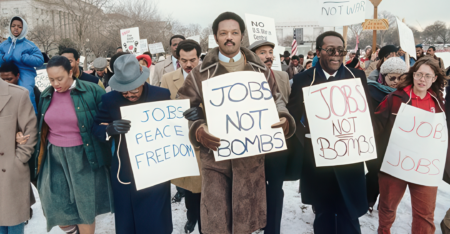By Stacy M. Brown
Black Press USA Senior National Correspondent
Black Friday arrives this year in a country wrestling with the weight of policies that have stripped stability from millions of Americans and placed Black communities at the edge of economic ruin. Storefront lights shine as if the nation were whole, yet in living rooms across the country, families count the losses of a political agenda that has torn apart the federal workforce and shattered the financial security of those who once depended on it. Hundreds of thousands of Black federal workers have been removed from their positions since Trump returned to office, and the effect on neighborhoods, schools, and generational wealth has been immediate.
The crisis facing Black women is even deeper. The National Partnership for Women and Families reports that 265,000 Black women have been pushed out of the labor market since January, and the unemployment rate for Black women has climbed to 7.5 percent, which is the highest in years. “These numbers are damning and confirm what we’ve long known to be true,” said Democratic Congresswoman Ayanna Pressley. “Under Donald J. Trump, Black women continue to face a crisis of disproportionately high unemployment. Their systematic pushout not only has dangerous consequences for Black women, Black families, and Black futures. It is also a glaring red flag for the entire U.S. economy.”
This is the country entering Black Friday. It is why the Mass Blackout movement and the We Ain’t Buying It coalition have stepped forward to reclaim the weekend that once symbolized celebration. Their message calls for shoppers to keep their money, their labor, and their attention away from the companies they believe profit from silence while Black households are battered by economic loss. “No spending. No work. No surrender,” the Mass Blackout coalition announced in its call to action, which accuses the nation’s corporate power structure of thriving while ordinary people struggle to survive.
The second coalition focuses its attention on retailers like Amazon and Home Depot. Activists accuse these companies of cooperating with or benefiting from Trump’s political agenda. LaTosha Brown, cofounder of Black Voters Matter and a member of the We Ain’t Buying It coalition, delivered her remarks in the coalition’s public statement. “We ain’t buying this foolishness. We’re not buying this racism. We’re not buying the abandonment of DEI. We’re not buying that the wealthiest country in the world cannot take care of its own citizens,” she stated. “If they want to call it Black Friday, let’s show them what a Black Friday really looks like.”
Home Depot issued its response after activists accused the retailer of working with immigration authorities during enforcement actions. The company stated that it is not notified before such actions occur and that it is not involved in them. Organizers remain unconvinced and continue to include the retailer in holiday boycott plans.
Amazon has faced scrutiny for working conditions and for the $1 million it contributed to Trump’s inauguration, which boycott leaders cite as evidence of political alignment. The coalition argues that Amazon has benefited from federal policy while workers across the country face tightening hours and declining wages, and its owner, Jeff Bezos, has fully capitulated to Trump.
Behind all these confrontations sits a larger truth. Black Americans are living through an economic emergency that has been shaped by federal policy decisions targeting the jobs, protections, and historical pathways that built the Black middle class. Analysts at the Center on Budget and Policy Priorities report that Trump’s agenda has attacked food assistance, health care, and family income supports at the very moment when unemployment among Black women is rising, and Black communities are losing stable federal careers that once offered a route out of poverty.
Organizers say this Black Friday is not about discounts. It is a line drawn by people who are tired of being told to spend in a country that is stripping away their ability to live. It is a refusal to pretend that holiday lights can hide the harm done to families who have been pushed to the margins of the economy.
The final word from organizers cut through the noise of the season. “We’re not buying from companies that won’t stand with us,” LaTosha Brown stated. “Our dollars will go elsewhere.”







